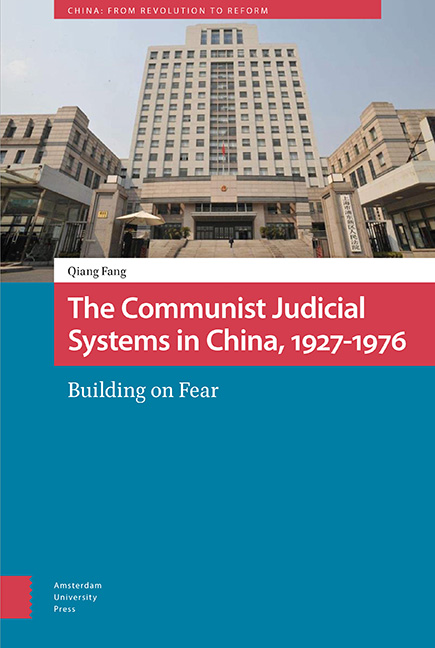Book contents
- Frontmatter
- Contents
- List of Tables
- Dedication
- Acknowledgement
- Acronyms
- Introduction: Building on Fear
- 1 Born in Blood: Origin of the Communist Judicial System in China, 1927–1935
- 2 Cornerstone or Aberration?: The Communist Judicial System during Wars with Japan and the GMD, 1936–1949
- 3 From “Excessive Lenience” to Harshness: The Communist Judicial System in the Early PRC, 1949-1952
- 4 A Deliberate Purge: Legal Reform in the Early PRC, 1952-1953
- 5 A Golden Age?: The Communist Judicial System in China, 1953-May 1957
- 6 The Great Leap of Law: The Communist Judicial System in China, 1957-1965
- 7 Not the Worst Period of Law: The Communist Judicial System in the Cultural Revolution, 1966-1976
- Conclusion: From Party’s Fear to People’s Fear
- Bibliography
- Index
1 - Born in Blood: Origin of the Communist Judicial System in China, 1927–1935
Published online by Cambridge University Press: 18 June 2021
- Frontmatter
- Contents
- List of Tables
- Dedication
- Acknowledgement
- Acronyms
- Introduction: Building on Fear
- 1 Born in Blood: Origin of the Communist Judicial System in China, 1927–1935
- 2 Cornerstone or Aberration?: The Communist Judicial System during Wars with Japan and the GMD, 1936–1949
- 3 From “Excessive Lenience” to Harshness: The Communist Judicial System in the Early PRC, 1949-1952
- 4 A Deliberate Purge: Legal Reform in the Early PRC, 1952-1953
- 5 A Golden Age?: The Communist Judicial System in China, 1953-May 1957
- 6 The Great Leap of Law: The Communist Judicial System in China, 1957-1965
- 7 Not the Worst Period of Law: The Communist Judicial System in the Cultural Revolution, 1966-1976
- Conclusion: From Party’s Fear to People’s Fear
- Bibliography
- Index
Summary
Abstract
This chapter traces the origin of the Communist judicial system in its Jiangxi Soviet base area (c. 1927-1935). Facing repeated GMD military attacks, the CCP formed its own army and mobilized its judicial system to counter its internal and external enemies. Born in blood and fear, the primitive Communist judicial system in CCP bases was from its outset designed as an integral mechanism of the Party based on Marxist and Leninist theories. Its principal objective was to eliminate counterrevolutionaries and protect the fledgling Soviet base (i.e. elected body that was different from the Soviet Union). Alarmed by mass killings and brutal torture by Red armies, the CCP took steps to create a more formal judicial system after 1931 that was expected to comply with certain legal procedures. Still, the Communist judicial system was not independent of the Party. Alleged criminals’ confessions, often under pressure including torture, remained the main basis of adjudication.
Keywords: born in blood, Minxi Soviet government, Jiangxi Soviet base, wartime judicial system, GMD military campaign
On September 13, 1933, the Soviet Court of Huang County in the recently established Chinese Soviet Republic (1930-1935) was completing a trial of six alleged criminals. According to the court, they were Huang Yufa, Zhang Wenshun, Zhou Mingzhao, Ou Shangqiu, Wu Chunfen, and Tu Laoxi. Huang Yufa was a landlord, a member of the class which the Chinese Communist Party (CCP) regarded as antagonistic, but the rest were all poor peasants or tenants. Huang had joined the Nationalist Party (the Guomindang, or GMD) in 1932 and had allegedly participated in a battle that resulted in the capture and killing of around 80 revolutionary commoners and comrades. Like Huang, Zhang Wenshun had joined the GMD and was a private in the Nationalist army. Zhang had joined Zhou Mingzhao and several other GMD soldiers in sneaking into a Communist base to spy on the Red Army. He had carried a handgun and dozens of bullets.
Unlike the three GMD soldiers, Ou Shangqiu was a 39-year-old poor peasant. On the evening of August 20, two Red Army soldiers had asked him to take them to join the GMD. According to the record, Ou had agreed to do so. Wu Chunfen was another poor peasant.
- Type
- Chapter
- Information
- The Communist Judicial System in China, 1927–1976Building on Fear, pp. 37 - 74Publisher: Amsterdam University PressPrint publication year: 2021



